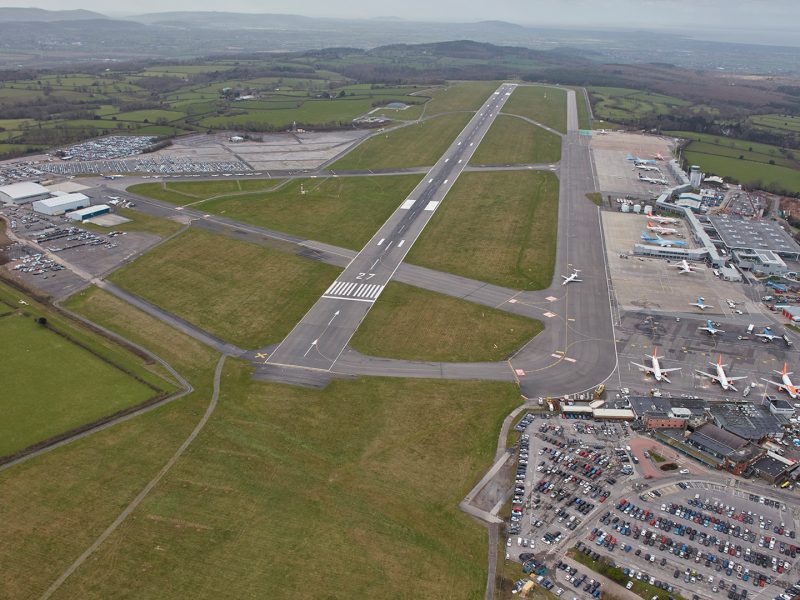By John Wimperis, Local Democracy Reporter: Bristol Airport has insisted it is “critical” to the region’s economy after MPs warned that airport expansion could put the country’s net zero goal in “serious jeopardy.”
A report by the House of Commons’ Environmental Audit Committee released last week warned that expanding airports in the United Kingdom would make the government’s climate targets “significantly more difficult to achieve and at much greater effort and cost.” It added: “The government has not demonstrated that the economic growth from airport expansion provides enough benefit to outweigh the negative climate and environmental impacts it will lead to.”
Although the report is not specific to Bristol Airport, Mary Collet of anti-expansion campaign group Bristol Airport Action Network (BAAN) said the report was “really important.” In 2023, BAAN took Bristol Airport to the High Court to try and stop it expanding to 12 million passengers per year. BAAN lost the case and the airport is now planning to apply to expand again to 15 million passengers per year.
Ms Collet said said: “It is quite ironic that their first recommendation is that the government should actually quantify whether expansion does bring any economic growth. The last Bristol Airport expansion was allowed, despite huge local opposition, largely because the inspectors thought that the economic gain would outweigh the environmental harm. BAAN have been saying for some time that the evidence from Bristol Airport’s previous expansions does not show any real economic benefit.”
The group claimed: “Bristol Airport has previously wildly over-estimated future jobs and economic gain but sadly we’re all well aware of the harms that expansion brings in terms of more air pollution, more noise and more traffic. In the survey BAAN recently carried out, 84% of people living near the airport said they felt no economic benefit at all from living close to the airport.”
But Bristol Airport said it was “untrue” that it had overestimated future jobs. It said its planning application to expand to 12 million passengers per year had predicted the creation of 800 new jobs, and it had already exceeded this despite being “some way” from achieving 12 million passengers.
A spokesperson for Bristol Airport said: “The airport is one of our area’s largest private sector employers, with over 5,800 people working on-site. The number of people working here has more than doubled in the past 20 years and continues to grow faster than predicted. We’re critical to the region’s economy, providing links to overseas markets and welcoming inbound tourists.”
The spokesperson added: “Our proposals to grow would deliver 1,000 extra on-site jobs, create new direct links to the Middle East and North America, and generate an additional £1 billion for our regional economy. We’re investing heavily to achieve net zero airport operations by 2030.”
While “airport operations” are planned to be net zero by 2030, covers the functioning of the airport’s buildings and vehicles — but not the planes taking off and landing there. But the airport said: “Our region is one the world’s great centres for aerospace and a hub for new flight technology. Bristol Airport is working in unique partnerships with the aerospace sector to accelerate the arrival of zero emissions flight.”
Bristol Airport lies within North Somerset and it will be up to North Somerset Council to decide whether to grant planning permission for the latest expansion plan. Councillors refused planning permission for its expansion to 12 million passengers per year but this was overturned by the planning inspectorate after a 36-day long public inquiry in 2021.
Unveiling the Environmental Audit Committee report, committee chair Toby Perkins MP said: “The aviation industry is critically important to the UK, but it’s also one of the hardest sectors of our economy to decarbonise. The government has made clear it is set on expanding airport capacity; the committee has investigated how it can do that whilst meeting its own environmental targets. Meeting our decarbonisation targets is already a major challenge. Expanding airport capacity is likely to make that task much harder.”
He said: “The government is proposing to expand airport capacity because it will help to grow the economy. But Ministers were unable to point us to solid evidence setting out how much growth such expansion would deliver. If these plans are ever to get off the ground, it’s vital that the government provide us with some hard facts.
“This problem can’t simply be outsourced to industry; the scale of the challenge is too great and only government has access to some of the tools needed. It’s time for the government to step up and take responsibility for its own targets. I’m concerned that the alternative is a lose-lose scenario that leaves a dynamic net zero economy out on the runway.”
The airport said it would be submitting economic analysis as part of its planning application to expand to 15 million passengers per year.
Harry Mottram adds: The airport began life 1927 as a flying club before being used as an RAF base in the war. After 1945 it reverted to being a club base for light aircraft and gliders before becoming Bristol Lulsgate Airport in 1957. Since then, it has been slowly upgraded from an annual passenger count of 33,000 to today’s millions. Initially it was owned by the Council but became a public limited company in 1987 resulting in a further upgrading – and an end to the A38 traffic crossing the runway in between flights. The airport charges £7 for dropping off and picking up passengers by car – with major work continuing in the infrastructure around the airport. Bristol Airport is owned by Ontario Teachers’ Pension Plan (OTPP) although a sale of OTPP’s stake to Macquarie Asset Management is subject to regulatory approval and is expected to complete later in 2025. In addition to OTPP, Australia’s New South Wales Treasury Corporation (“TCorp”), the Australian Retirement Trust (“ART”) and StepStone own a minority interest in the airport.

Bath Voice and Local Democracy Reporters
The journalists are funded by the BBC as part of its latest Charter commitment, but are employed by regional news organisations. A total of 165 reporters are allocated to news organisations in England, Scotland, Wales and Northern Ireland including Bath Voice. These organisations range from television and radio stations to online media companies and established regional newspaper groups. Local Democracy Reporters cover top-tier local authorities, second-tier local authorities and other public service organisations.
Bath Voice Monthly Newspaper is distributed free to thousands of homes and some supermarkets – distributed from the first of the month. Harry Mottram is the News Editor
Email him at news@bathvoice.co.uk Bath website: https://bathvoice.co.uk/news/
Bath Facebook: https://tinyurl.com/bdtf2kep Also on Twitter: https://twitter.com/bath_voice And Bluesky @bathvoicenews.bsky.social And also on Instagram https://www.instagram.com/harrymottram6/
Read the newspaper online at :https://issuu.com/bathvoice
To advertise to thousands of Bathonians call Shaun on 07540 383870 or email him on sales@bathvoice.co.uk


